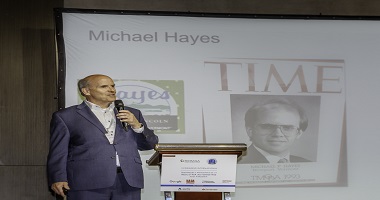
Del 6 al 8 de septiembre, se llevó a cabo el II Congreso Internacional "Tendencias y Novedades de la Industria Automotriz Post Pandemia", organizado por SIOMAA en conjunto con su socio estratégico la NADA (National Automobile Dealers Association), en el Hilton de Pilar, Argentina al cual asistieron mas de 140 personas. Durante el primer día de exposiciones, el Director de la NADA, Michael Hayes, presentó su charla sobre las nuevas tendencias en canales de venta en la industria automotriz. En su exposición, hizo hincapié en la necesidad de incorporar los nuevos hábitos digitales en los procesos de venta y atención al cliente para lograr una verdadera experiencia omnicanal. Además, destacó la importancia de entender los cambios en la conducta de los consumidores en torno al uso de canales digitales, no solo para comprar sino también en el consumo de servicios. Hayes explicó cómo la pandemia aceleró este proceso y la necesidad de adaptarse a estos nuevos hábitos para poder competir en el mercado. Otro tema relevante que Hayes abordó en su exposición fue el impacto de la electromovilidad en la industria automotriz. Destacó la necesidad de maximizar las nuevas oportunidades que se van a producir en este campo y de adaptar el modelo de ventas y servicios a las nuevas tecnologías. Durante la segunda jornada, el expositor Guido Vildozo, Senior Management de Americas Light Vehicle Sales Forecasting en S&P Global Mobility, presentó una interesante charla sobre diversos temas relacionados con la situación económica y productiva de la industria automotriz a nivel global. En primer lugar, Vildozo hizo un análisis del panorama económico mundial y cómo ha impactado en la producción y venta de vehículos. Además, presentó los escenarios de producción y previsión para los años 2022-2026, con el objetivo de brindar una visión más completa del futuro del mercado automotriz. Finalmente, el expositor presentó los escenarios de producción y ventas de vehículos livianos en Latinoamérica, una región con particularidades propias y desafíos específicos para el sector automotriz. Para completar la segunda jornada, el docente de la UCA especializado en Ingeniería de software, Alejandro Bianchi, presentó una interesante charla acerca de la revolución digital y su impacto en las organizaciones. Bianchi afirmó que la transformación digital ya no es una opción para las empresas, sino una realidad que deben abordar para mantenerse competitivas en el mercado actual. Para ello, presentó una guía para llevar adelante la transformación digital en las empresas. Durante su exposición, el disertante destacó cinco tecnologías que apalancan la llamada Transformación Digital: Movilidad, RPA, Cloud Computing, Big Data, IoT, Inteligencia Artificial y la Internet Industrial. Asimismo, explicó cuál es el impacto de estas tecnologías en la cultura de las organizaciones y cómo las empresas deben prepararse para estos desafíos. La presentación de Alejandro Bianchi fue muy valiosa para los asistentes al congreso, ya que brindó una guía clara para llevar adelante la transformación digital en las empresas y destacó la importancia de esta tarea para mantenerse competitivos en el mercado actual. En la última jornada de capacitación, Lorena Valenti, Global Account Executive de Google, brindó una charla sobre el "Consumidor en un mundo digital 2022" y cómo afectará el futuro de la industria automotriz y, en particular, a los concesionarios. Durante su exposición, Valenti destacó la importancia de adaptarse a las nuevas tendencias y cambios en los hábitos de consumo de los clientes, y ofreció estrategias y herramientas para mejorar la presencia online de los negocios del sector. Entre los temas que abordó, se destacaron: • Waze: Destination based Marketing • Cómo mejorar la presencia online a través de la página web y Google Mi Negocio. El II Congreso Internacional "Tendencias y Novedades de la Industria Automotriz Post Pandemia" fue importante para los asistentes porque les brindó la oportunidad de actualizarse y conocer las últimas tendencias y novedades en la industria automotriz, especialmente en el contexto post pandemia. Los expositores y disertantes que participaron en el congreso compartieron su conocimiento y experiencia en temas como la transformación digital, los nuevos modelos de negocio, la electromovilidad, las estrategias de venta y atención al cliente, entre otros. Los asistentes pudieron obtener información valiosa sobre cómo enfrentar los desafíos actuales del sector y prepararse para el futuro, así como también interactuar y compartir experiencias con otros profesionales de la industria. Además, el apoyo de la NADA, brindó un respaldo y prestigio adicional al evento. En resumen, el congreso fue una oportunidad única para los asistentes de mejorar su conocimiento y habilidades en la industria automotriz y establecer contactos valiosos con otros profesionales.